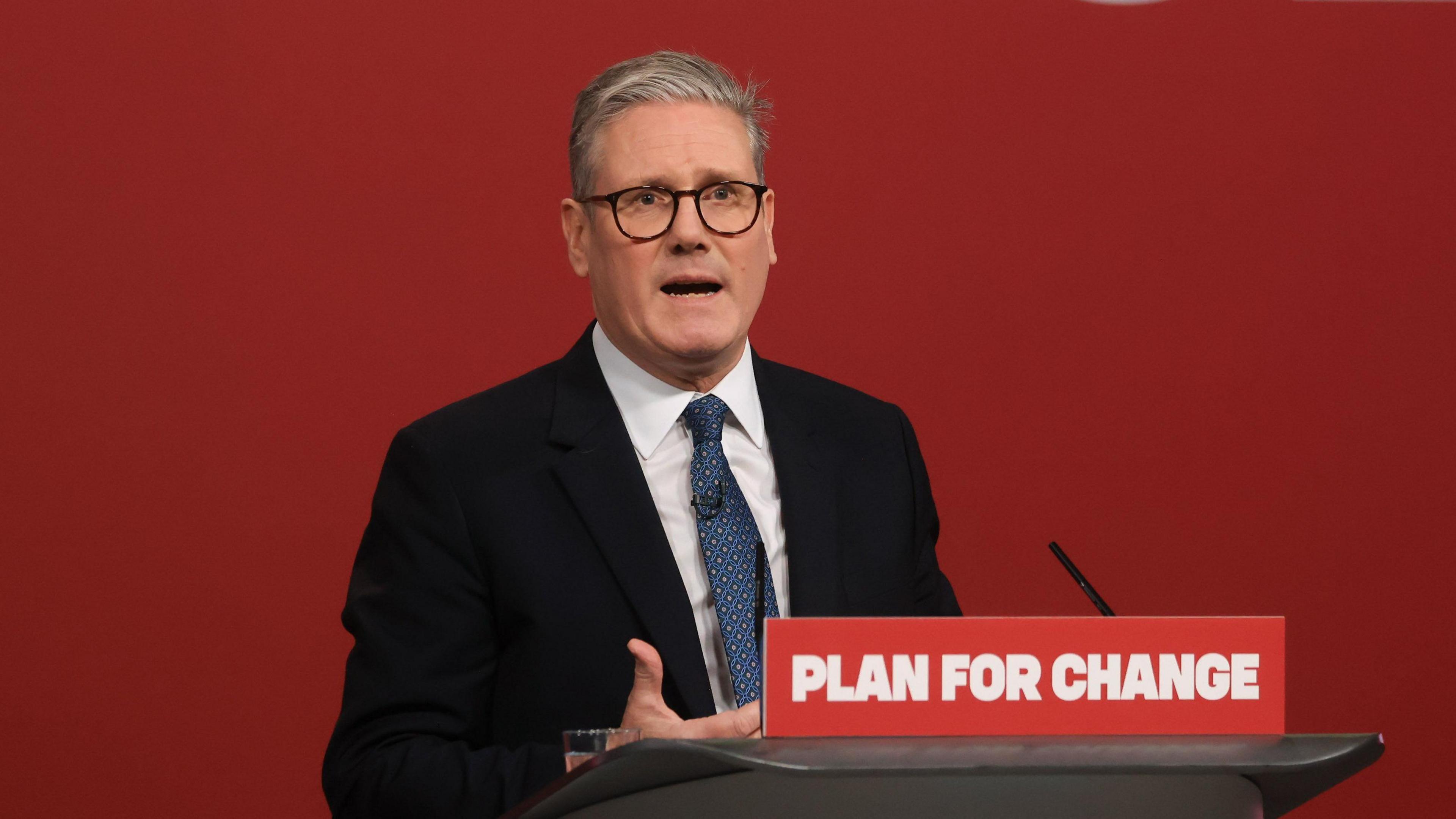Scandals and Failures: How Keir Starmer Lost the Trust of Britons in His First Year

“Starmer has offered Labour MPs massive concessions on his controversial welfare bill.”
The Labour Party is experiencing a new round of internal conflict as UK Prime Minister Keir Starmer withdraws his controversial welfare reform bill.
A year ago Starmer was elected on a platform of ‘Change’ by voters furious with the Conservatives, who burned through leaders as public services creaked.
But after 12 months of major political missteps and screeching U-turns, voters and Labour MPs alike are now turning on the prime minister.
In recent polls, Labour is heading for a landslide defeat, but the split on the British right between the Reform and Conservative parties is keeping Starmer in a close race with Nigel Farage, who currently leads the polls.
A Find Out Now poll indicated that only 25% believe Starmer will remain in Downing Street by the next election, with even Labour supporters split on the question by 50%.
The Telegraph described Starmer's first year, which saw an embarrassing climbdown on welfare reform, as catastrophic.
“Of the prime ministers since Thatcher, only Gordon Brown had a worse net approval rating at the same stage in his premiership,” it added.
Political Dilemmas
With numerous bargaining and financial concessions, UK Prime Minister Keir Starmer recently succeeded in defusing a rebellion by a large number of his MPs in the House of Commons against a welfare reform bill, despite his ruling party's 156-seat majority, which would enable it to pass any resolution.
Starmer, who has a record unpopularity before completing a year in office, and his Chancellor, Rachel Reeves, previously argued that amending the welfare plan would save £5 billion from the budget, a claim rejected by more than 126 of his MPs.
MPs' pressure and opposition to the bill prompted Starmer to partially backtrack on key provisions, which will cost his government approximately £3 billion of the planned reduction.
Subsequently, Starmer became a target of criticism and ridicule in the press. This U-turn in a policy he had previously declared unchangeable was Starmer's third in a few months, making him appear as a leader unable to adhere to a specific policy that would convince the public.
In May, Starmer dropped a plan to end winter home heating subsidies for millions of retirees. In June, his government announced a national inquiry into organized child sexual abuse after pressure from opposition politicians.
It's difficult to explain Starmer's recent U-turn in isolation from the economic and political context facing his leadership and the Labour Party less than a year after coming to power.
Labour's previous pledges to avoid tax increases and instead focus on budget reform and stimulating growth to create more jobs have not been very successful.
When Starmer abolished heating subsidies for retirees, the measure was met with public opposition, forcing him to back down, costing the budget £1.25 billion that had been earmarked for savings.
His most recent U-turn, the largest to date, came after he dismissed reports of a rebellion by his MPs as mere noise that would be drowned out by the majority.
However, upon his return from the NATO summit in The Hague, he was surprised to find that the rebels were more organized than he had anticipated, so he was forced to compromise.
There is currently talk in Westminster about the possibility of the government reversing its cap on child benefit, limiting it to two children per family, which could cost the budget an additional £3.5 billion.
Conservative economic institutions have warned that Starmer's recent U-turn to appease his MPs and their grassroots base could complicate his leadership's political trajectory and undermine confidence in the British economy.
“In this case, the Chancellor would have no choice but to raise taxes, which is now more likely because it would offset the costs of all previous changes,” they added.
However, Starmer's biggest dilemma remains fundamentally political, as confrontations between the party leadership and its popular base are uncommon for a government that has not yet completed its first year and enjoys an overwhelming majority in the House of Commons.

Starmer's Competence
Polling guru John Curtice said that Keir has had the worst start for any newly-elected Prime Minister, Labour or Conservative.
At the same time, Starmer has been warned that he may not celebrate his second anniversary in Downing Street.
An ally of Deputy Prime Minister Angela Rayner said that they expect the Labour leader to be sacked within 12 months.
Starmer's government defenders, led by Care Minister Stephen Kinnock, said he was open to a rethink and was putting Britain's interests before the party's.
Health Secretary Wes Streeting tried to rally support for Starmer, dismissing speculation about his leadership ambitions.
On the other hand, Starmer's other allies criticized the rebel MPs who forced him to back down on the benefit cuts.
A member of parliament told The Times that many MPs elected for the first time in July 2024 suffer from main character syndrome.
For her part, former minister Louise Hague, a prominent opponent of the government's partial cuts, called on Starmer to recalibrate his relationship with the British people and adopt a different approach to his government's economic and political strategy.
Some believe that Starmer's recent crisis highlighted the internal fragility within the Labour Party leadership and the dissatisfaction of influential factions with the prime minister's handling of social justice issues.
It is worth noting that the right-wing opposition and some Conservative MPs exploited the recent setback to describe him as yielding to internal pressure, which could weaken Starmer's position in the future to pass similar laws.

Declining Popularity
Things began to go wrong for Keir Starmer just weeks after becoming Prime Minister. By late summer 2024, Starmer was already facing serious problems with UK voters.
Despite facing a difficult situation, he made a series of decisions that alienated him from public opinion, to the point that those who voted for him may never return.
The Telegraph reported that the riots that erupted in July 2024, following the murder of three young girls in Southport, posed an early challenge that Starmer initially failed to address. The convictions of the perpetrators then fueled further anger.
Moreover, the most serious damage to Starmer's reputation came when, at almost the same time, Chancellor Rachel Reeves announced significant cuts to heating subsidies for retirees.
Starmer's first weeks in power were so disastrous that his popularity plummeted during that period. On the YouGov popularity tracker, his net rating dropped from zero to -9 in just two weeks.
Things worsened in September 2024, when the Labour government was plunged into a crisis over early prisoner releases.
The Ministry of Justice admitted that some of those released had committed very serious crimes, contrary to what the public had been led to believe.
At that time, Starmer's popularity took another hit when one of the released prisoners infamously thanked him for the privilege of being released early.

In a related development, a comprehensive poll by public policy research agency Public First for The Telegraph reveals the scale of the Prime Minister’s problems.
Currently, 53% of voters have a very unfavourable view of him, while just 26% view him favourably.
When asked about the promises Starmer has made progress on, the most common answer was ‘none of the above’, chosen by more than 39% of voters.
Only 24% said he had made progress in reducing waiting times for health services, while only 8% said he had made progress on the asylum system, and only 12% believed he had improved border security.
Only 10% believed Starmer had made progress in changing the country for the better, while 11% believed he had begun to restore hope, and 14% felt he had begun to end the chaos within the government.
A year ago, 47% of voters said they liked Starmer, while 47% said they disliked him. Now, 62% say they dislike him, while only 33% say they do.
A year ago, 32% of voters agreed with the statement ‘I don't like the Labour Party or Keir Starmer’, but a year later, that figure had risen to 44%.
More importantly, a year ago, voters considered Starmer a good leader by 40%, while today, 48% consider him a bad leader.
Sources
- A year after gambling on Starmer, Britain is gripped by buyer’s remorse
- Starmer’s attempt at welfare reform roils his party, capping a troubled first year in office
- Keir Starmer has had worst start of any new PM, says polling guru
- Starmer offers ‘massive concessions’ on welfare bill to Labour rebels
- Six in ten say it is unlikely that Starmer can unite Labour under his leadership [Research]











